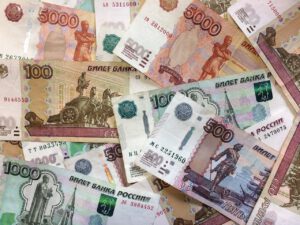By Cristian Bustos. Originally published at ValueWalk.

The Russian ruble has soared to seven-year highs, fueled by capital controls that include restrictions on the withdrawal of foreign currency savings by Russians. The country could start buying currencies from “friendly countries” to try to influence the exchange rate of the dollar and the euro.
The Russian Ruble Rise
The capital control measures imposed by the West are denting Russia’s export earnings by reducing the value of earnings in dollars and euros from foreign sales of raw materials and other goods.
Q1 2022 hedge fund letters, conferences and more
As a means to counteract the strong rises in the ruble, as revealed on Wednesday by the Finance Minister, the Bank of Russia is weighing the purchase of currencies by friendly economies.
According to The Moscow Times, Moscow implemented various measures to prevent the collapse of the ruble just after the invasion of Ukraine began. The Bank of Russia raised interest rates, capital controls were implemented, and despite everything, the Russian currency initially suffered sharp falls.
Those declines were triggered by fears of harsh Western sanctions under the invasion of Ukraine.
After a few weeks since the beginning of the invasion, the Russian ruble has strengthened immensely, and Western countries have stopped exporting to Russia while still importing many raw materials. This has generated a large current account surplus that is driving up the ruble exchange rate.
Russian Ruble Effect
In addition, it is suspected that many Russian fortunes could have repatriated their capital —they have brought foreign currency to exchange for rubles in Russia— to avoid sanctions abroad.
Now, Russia wants to weaken the ruble against the euro and the dollar, but nobody accepts the sale of rubles for dollars or euros, so Russia wants to enforce what is known as cross rates.
The Bank of Russia can sell rubles to buy other currencies in an attempt to depreciate the ruble exchange rate —which in turn affects the ruble-dollar exchange rate through arbitrage.
Finance Minister Anton Siluanov says the ministry was willing to step in and hoard currencies of “friendly countries.”
“Through the currencies of friendly countries, through the exchange rates crossed with the dollar and the euro, it will be possible to regulate the cost of the euro and the dollar against the ruble,” he added.
Updated on
Sign up for ValueWalk’s free newsletter here.



